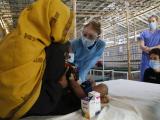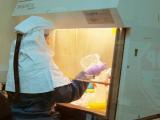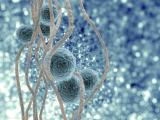Sep 17, 2003 (CIDRAP News) The National Institute of Allergy and Infectious Disease (NIAID) today announced a new $85 million program to study the human immune response to diseases of bioterrorism and develop vaccines, drugs, and other countermeasures.
The NIAID named five "Cooperative Centers for Translational Research on Human Immunology and Biodefense": Baylor Research Institute, Dallas; Dana-Farber Cancer Institute, Boston; Emory University School of Medicine, Atlanta; Stanford University School of Medicine, Stanford, Calif.; and the University of Massachusetts Medical School, Worcester. The agency said it will provide about $85 million over 4 1/2 years for the centers.
"A particular emphasis of these cooperative centers will be moving new findings about immune system function out of the lab and into clinical trials," NIAID Director Anthony S. Fauci, MD, said in a news release. "The flexibility of the program will allow research projects to be redirected quickly as new information is generated in the lab and the clinic."
Investigators working in the new program will form a research network with a focus on the human immune system, the NIAID said. The agency noted that it is much harder to study immunity in humans than in animals because, among other reasons, humans cant be deliberately exposed to pathogens.
One aim of the new program is to develop technologies to help overcome the obstacles to studying immune responses, Helen Quill, PhD, of NIAIDs Division of Allergy, Immunology and Transplantation (DAIT), said in the release. For example, researchers hope to develop new ways to get information from single immune cells, so that very small tissue and blood samples can be tested. Quill said plans also call for developing new imaging techniques to allow noninvasive, real-time views of the body as it reacts to a vaccine or infection.
The new centers will strongly emphasize information sharing, Daniel Rotrosen, MD, director of the DAIT, stated in the news release. "Ultimately, we hope to characterize human immune responses to disease-causing organisms and develop therapies that strengthen these responses, whether the organisms are deliberately released or arise naturally in the environment," Rotrosen said. "The cooperative centers will encourage the kind of synergy needed to meet that goal."
See also:
NIAID news release
http://www.niaid.nih.gov/news/newsreleases/2003/Pages/researchaward.aspx




















